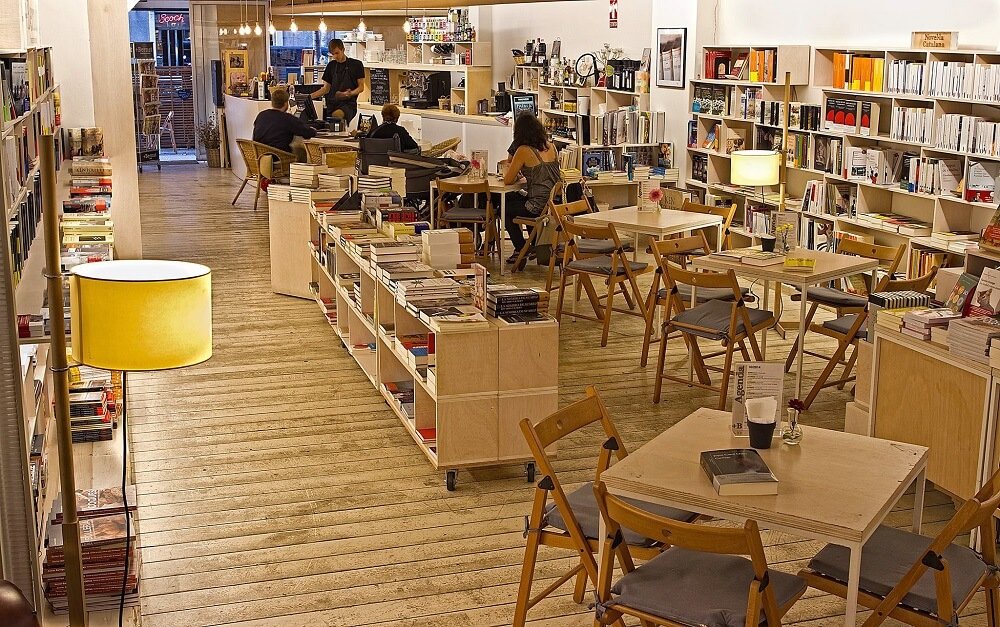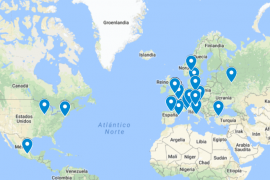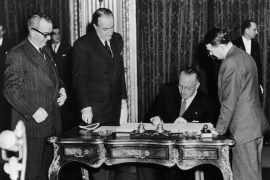[dropcap letter=”A”]
mazon was founded as an online bookstore, offering books at home at low prices, competing with traditional bookshops. Then came the electronic book, which further threatened to disrupt the physical book’s supremacy as a store of human knowledge since the invention of writing. The paper book seemed condemned to suffer the same fate as many other physical information storage formats. We had earlier said goodbye to vinyls, cassettes, videos on VHS or Betamax. The holocaust of CDs, DVDs and celluloid would soon come. We are experiencing the simultaneous defeat of the printing press. But the paper book is, unexpectedly, surviving with iron-clad ill-health.
For Amazon today, the sale of books is a marginal business (soon it will drop below 5% of total sales), although it is still a real threat to traditional bookshops. The phenomenon is not new: only between 1995 and 2000, 43% of all bookshops closed in the United States, with the incursion by Amazon being the main reason. Just ask Barnes & Noble, who for decades was the largest book distribution company in the world thanks to their network of bricks-and-mortar bookshops. Today they are fighting just not to go bankrupt and is competing with Amazon’s physical bookshops, which, surely, will reach our latitudes very soon.
But paradoxically, the crisis and the closure of many traditional bookshops in the United States has coincided with the emergence of independent bookshops. Borders, another large American bookstore chain, had to close down in 2011. But, oddly enough, between that year and 2015 the Association of American Booksellers reported a 35% growth in the number of independent bookshops.
Barcelona is not comparable in most aspects to such a huge market as the United States, but we know for sure that when an earthquake shakes the American markets, the jolt will also reach us sooner or later. In 2014 it was a black year: just in the province of Barcelona, 132 bookshops disappeared, going from 458 to 326. The economic crisis, the expiration of old rents and the widespread hike in prices of premises in commercial areas also played a role. Over the last few years we have seen close their shutters such diverse, emblematic bookshops as Negra y Criminal, the heroic bookshop in la Barceloneta, the baby of recently deceased Paco Camarasa, and Montse Clavé. Àncora I Delfín (1962-2012), whose iconic sign is conserved at the Disseny Hub Barcelona; the Llibreria Marínez Pérez (1890-2012), specializing in art and which featured customers like Picasso, Gaudí, Puig i Cadafalch, Joan Miró and Salvador Dalí; the Catalonia Bookshop (1924-2013), ominously replaced today by a McDonald’s; or Proa, Pequod, which in many ways was so much before its time, but could not overcome the crisis… the string of corpses is endless.
The phenomenon, however, seems to have been reversed. The last two years has seen 17 bookshops close in Catalonia, but 55 new one have opened. The balance is thus positive. But the success of the new libraries is unrelated to new approaches. In addition to maintaining the traditional role as connoisseurs of the product they sell, the new booksellers are staking on turning their stores into centres of cultural agitation. And often the new bookshops are located in residential neighbourhoods, partly because it is hard for a bookshop to pay the rents in [swanky] Passeig de Gràcia, and partly as a conscious decision to come closer to regular people’s lives and go for local customers. They are, in short, much more than mere business. They are almost signature bookshops. They don’t stock all the books that can be found online, but there is life and personal relations as well as literature.
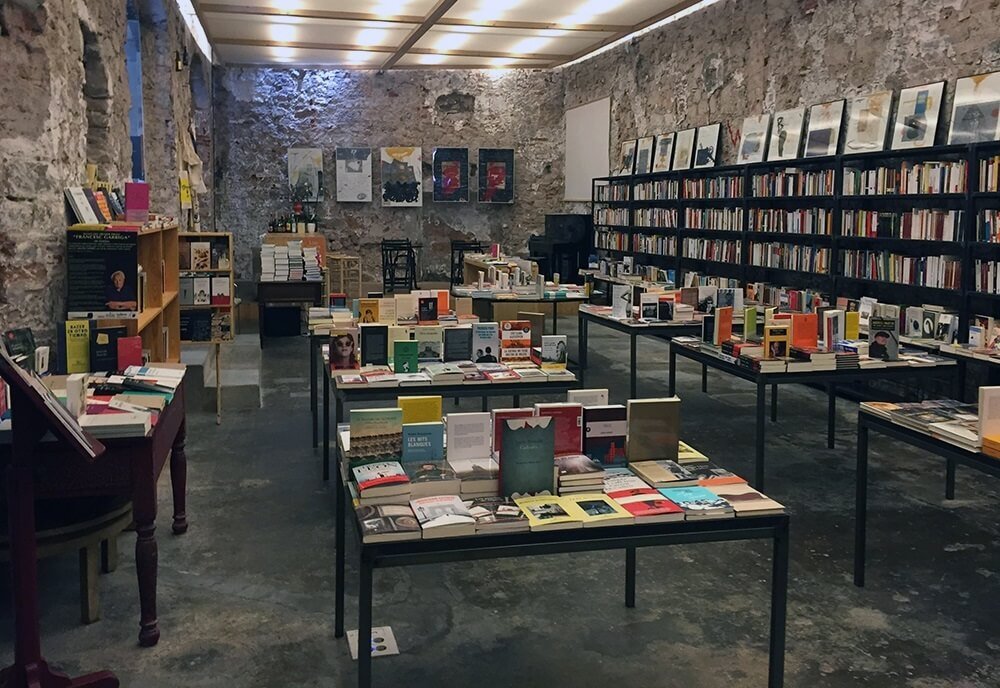
One of the pioneers of this new pack was Llibreria Calders, established in the Sant Antoni neighbourhood in back street of clearly literary resonance, [named after author] Pere Calders, and who knew how to focus on the new trend before the gentrifying avalanche that has invaded the area. It has a bar, a literary (and paraliterary) events schedule, and last but not least, it retains the most important thing a good bookseller must have: criterion. Isabel Sucunza and Abel Cutillas’ bookshop complies with the role of the bookseller as a first class prescriber, a far cry from the logistics genius that Amazon has become. Some people complain that books are not tagged with prices, and of the absent-minded hipsters who come in to rent bikes. Following Isabel Sucunza on Twitter or through her work as a columnist is also an excellent way to further fall in love with books and her bookshop. When they are asked to classify themselves, Llibreria Calders always reply that they are a bookshop specializing in books.
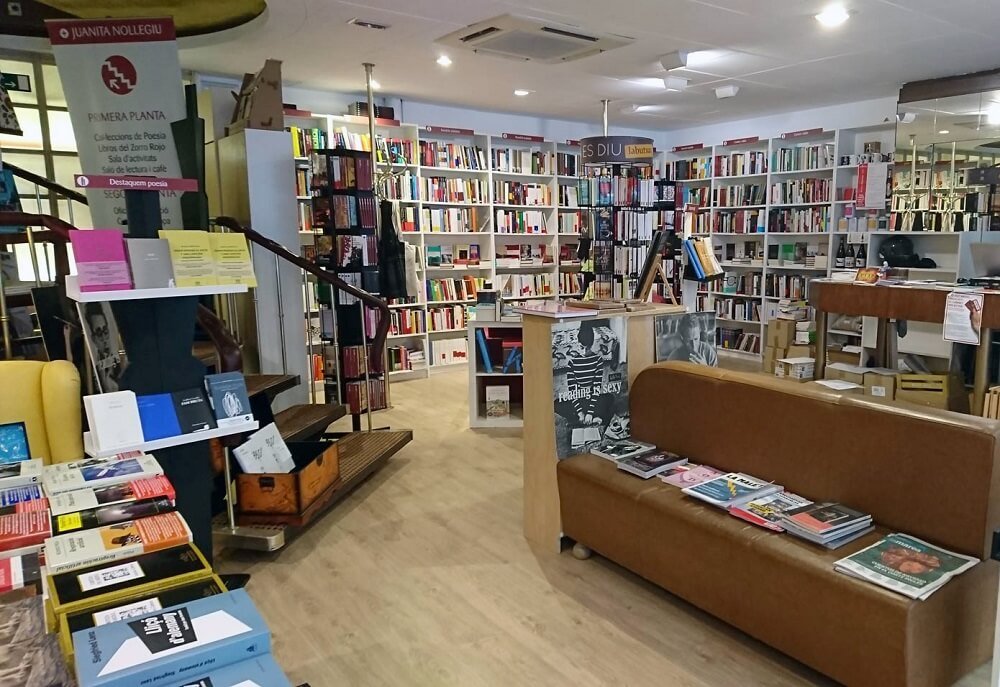
Together with Llibreria Calders, No Llegiu [(Don’t Read)] was at the forefront of the new wave of independent bookshops that have opened in Barcelona. The name is a provocation by its owner, the journalist Xavier Vidal, established since 2013 in an apparently un-literary neighbourhood as is Poblenou (Amistat, 22). The premises where they hold recitals, presentations, music and performances, was too small, and they moved to the three floor premises of the old Juanita store (Pons i Subirà, 3). To make it possible, they started a micro-funding campaign, and since 2017 it has occupied its new headquarters. The sofas invite you to taste the books before buying them, and if the customer does not leave empty-handed, they are offered a free coffee. On the ground floor there is the narrative, the graphic novel and a selection of poetry. On the second floor, which housed [pro-European] Fundació Catalunya Europa for a time, there is the headquarters of the Escola de Lectura Creativa [the School of Creative Reading] associated with the bookshop, offering very intensive courses. They are open throughout the year from Monday to Sunday morning, except between June and September, when they close on Sundays. A brave, daring stake on a somewhat hipster marketing, because the comercial intelligence in the world of books cannot be the reserve of [publishers] Lara and [Amazon’s] Bezos.
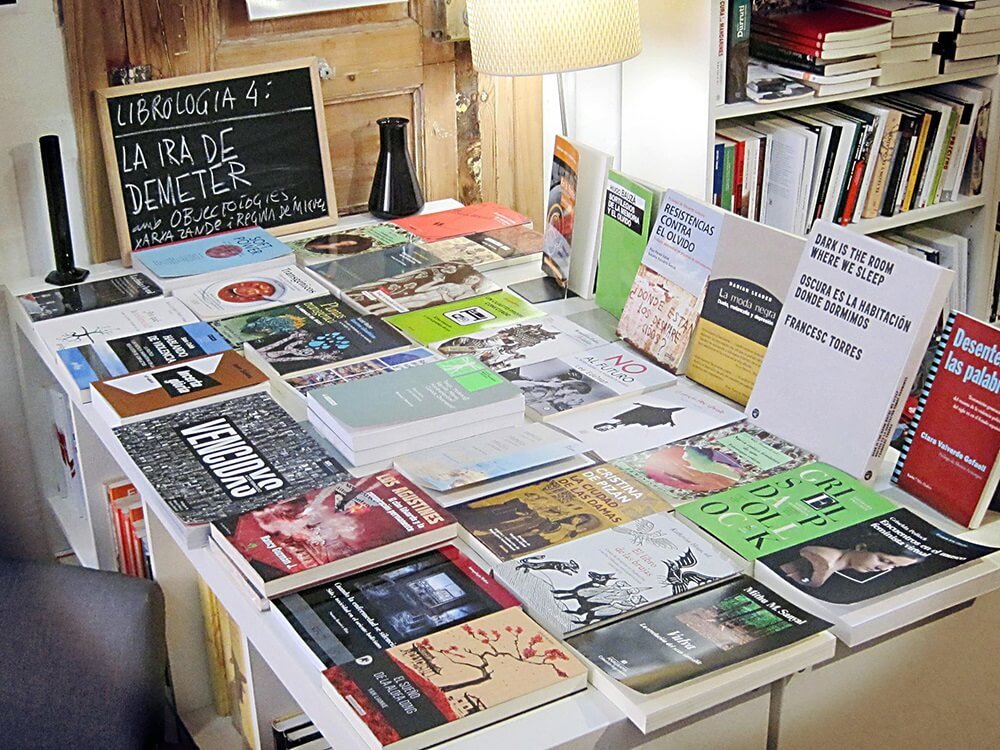
Linked to Barcelona’s age-old tradition of subversive libraries, but adapted to the zeitgeist, La Caníbal (Nàpols, 314) is a non-profit labour cooperative that aims to contribute to “an anti-capitalist, (trans) feminist and decolonized horizon.” Founded by Jesús Arpal Moya (artist, one half of Jeleton), Amanda Cuesta Hernández (art critic, curator, editor) and Julia Montilla Campillo (artist), it is declared a centrer for agitation before the business of bookselling. Consequently, their stock abounds in the subject of social transformation, in a clearly militant spirit. They also organize high-voltage political activities, and offer space for transformative initiatives and projects, always by radicals, against anything that can be described as hegemonic and with a gender discourse as the main thread of the majority of its activities.
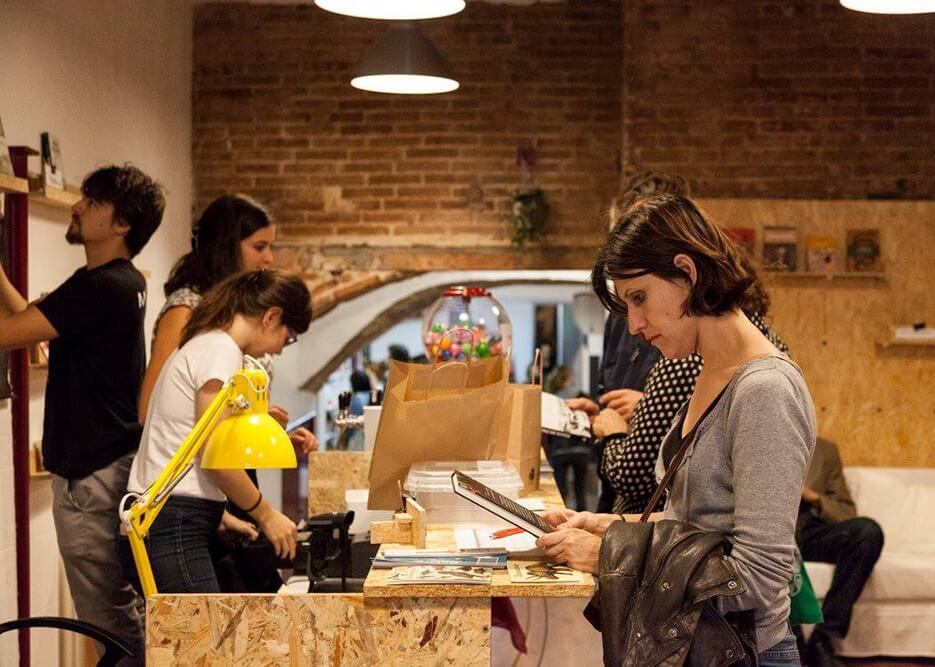
Established with the intention of becoming the bookshop in Poblesec (Blai, 40), La Carbonera functions as a cooperative and sells both new and second hand books. The range of activities includes reading clubs for children and adults, in several languages, poetry recitals or writing workshops. Becoming a member of the cooperative grants you the right to discounts, and it is also the strategy with which La Carbonera wants to strengthen ties with the neighbourhood. Children can enjoy specific activities every Saturday morning, and they also organize events such as the recent improvised poetry contest, a poetry slam held in a boxing ring loaned to them by the Ateneu d’Oficis, [a local cooperative]. This, too, is much more than a just booksshop.
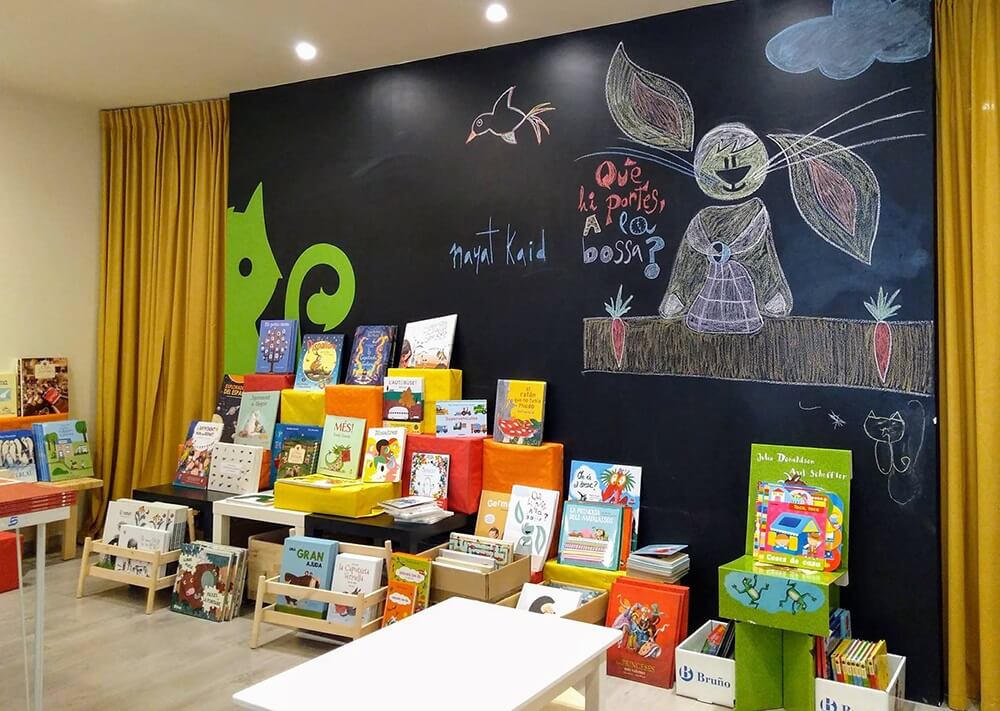
Located in the district of Les Corts (Caballero, 58), it specializes in children’s and youth literature, although they do not turn away from other genres. They have also incorporated coffee as an element of commercial attraction in order to delve into the books and turn the purchase into a more pleasant experience. The corporate image, here with cats omnipresent at the establishment, is also one of the features that differentiates the new independent bookshops. And as seems the norm in the new generation of booksellers, they also work at creating an intense schedule of activities for the whole family: storytelling, craft workshops, reading clubs, presentations, readers’ challenges. There is also a huge board where you can leave your own artistic mark. The owner, Marta Gil Soler, worked as a teacher before specializing in financial management, and then graduated from the University of Barcelona’s Bookshop School. A multidisciplinary education that has now turned her into a well-schooled book-shopkeeper.
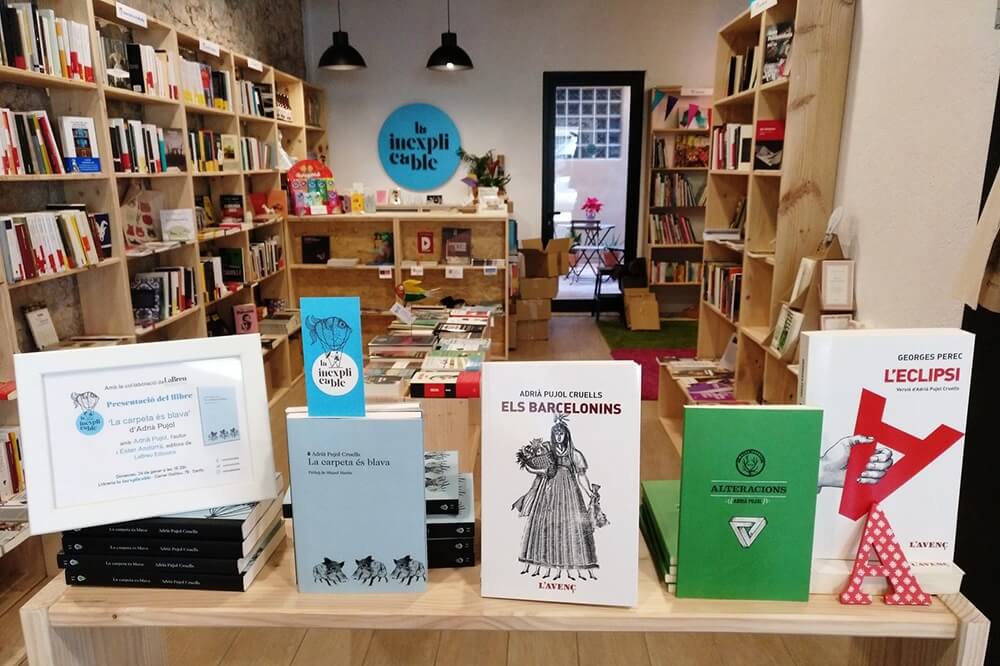
In the heart of Sants neighbourhood (Galileo, 78), Glòria Aquillo and Anun Giménez opened their bookshop at the end of 2017 in premises that had previously been a fruit shop. The name was a jocular response to the numerous comments warning them on embarking on the uncertain adventure of opening a bookshop in these times. In their case, the idea of setting up the business came about after participating in a reading club and, after doing a postgraduate degree on the subject, they decided to open the business. They want to it be a neighbourhood shop, but also a literary bookshop with few concessions to the most commercial books. Among the titles that will never be missing in their inventory are A Vindication of the Rights of Woman by Mary Wollstonecraft, or Invisible Cities by Italo Calvino, although they understand literature to be a category where graphic novels by Joe Sacco also have full rights. This June there have been activities such as literary creation courses, reading groups on various subjects and even literary vermouths with guest authors.
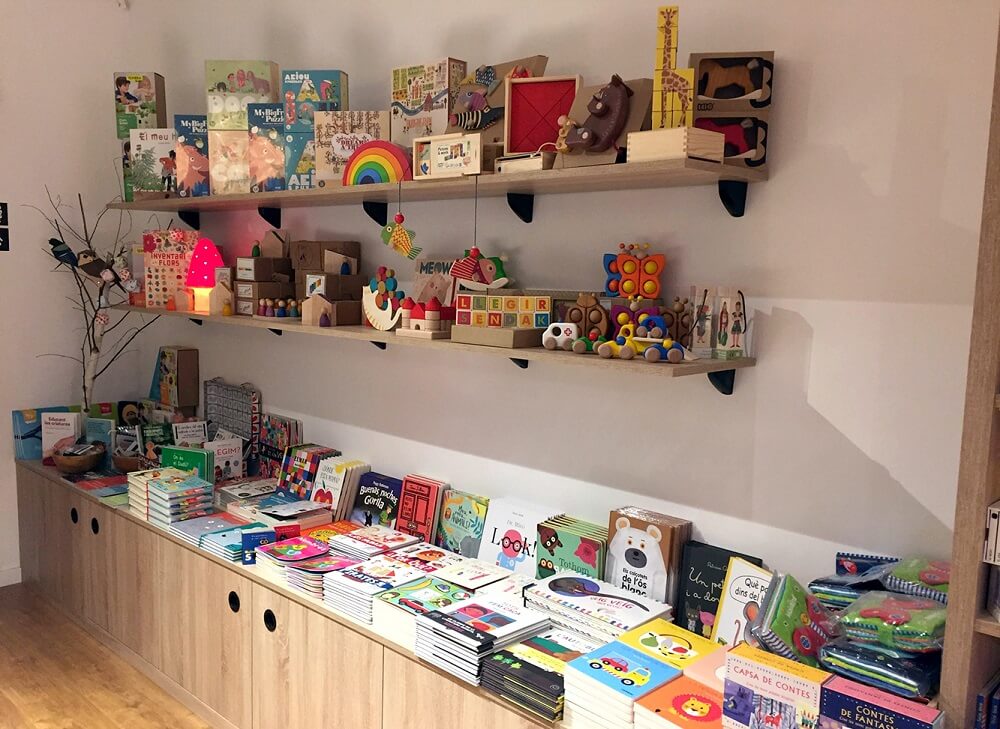
The University of Barcelona’s Bookshop School is creating a new generation of booksellers who are actively participating in the transformation of the business in the city. It has produced the owners of El Gat Pelut and La Inexplicable, and also Núria Cárcamo and Aitor Martos, the creators of Sendak (Còrsega, 461), a name that pays homage to Maurice Bernard Sendak, American illustrator and writer of children’s literature. This already gives us a clue what Sendak specializes in, books for younger readers. The education of the readers of the future is taken very seriously, through cooperation with schools, libraries, cultural organizations and facilities. Perhaps more necessary than ever in a time when the little ones are stuck to their screens with as much enthusiasm as grown-ups.
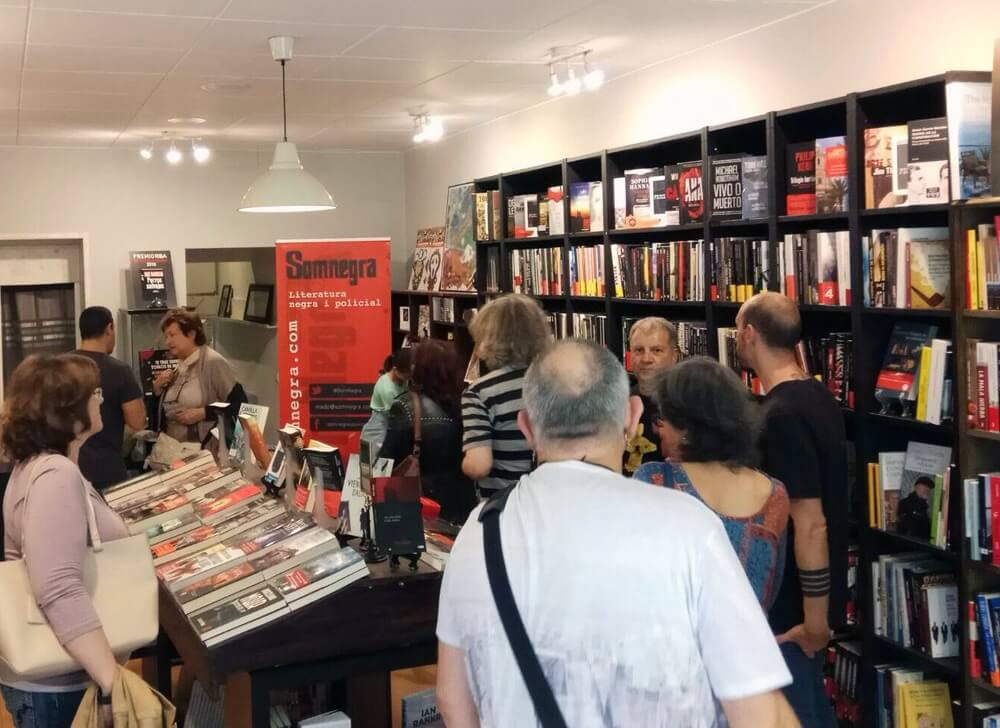
Inaugurated in September 2017, SomNegra (Aragó 108) Means to fill the gap Negra y Criminal left in the fostering of crime fiction in Barcelona. In this new incarnation, no mussels are present at the presentations, as had become the tradition of their predecessor, and in this case the online bookstore preceded the opening of the bricks-and-mortar bookshop. The basic reason is that the owner, Miguel Ángel Díaz, lived in Collbató and runs a stationery in Esparreguera—both towns over an hour from Barcelona—where he began to devote a corner to his favourite genre, but to reach his potential readers, the town was too small. Although he tried to link the town with crime fiction by organizing the Collbató Negre festival, which has brought many authors of the genre to the foothills around of Montserrat mountain. Díaz had a personal relationship with Paco Camarasa—deceased this year—but who personally cut the ribbon at SomNegra’s opening.
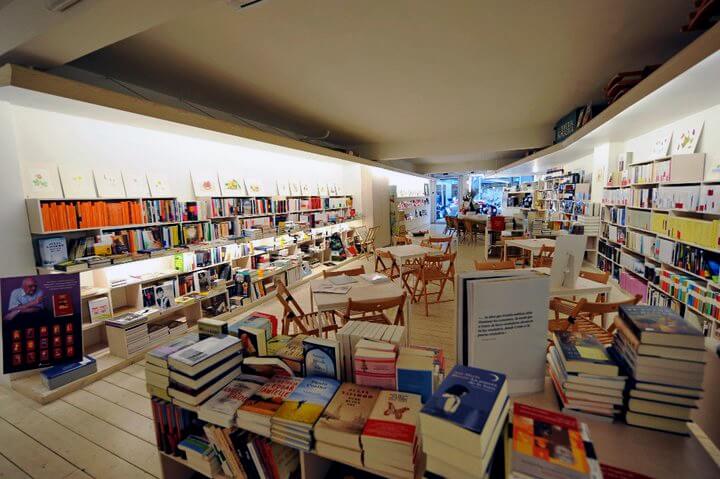
Montse Serrano is not exactly a newcomer to the world of bookselling. She has headed Bernat since 1978, when she was only 22 years old and decided to buy a small bookshop business in her neighbourhood. In 2010 she recognized the need to reinvent herself. She decided to recruit 25 new partners for her business, and with their help she moved to much larger premises (formerly housing a sex shop), she set up a cafeteria at the entrance, a piano at the back and started mixing tea, coffee, home-cooked food and cultural events to shelter the world of books. It is now a 50-member cooperative. That is how Bernat (Buenos Aires, 6-8) emerged, as a cultural warehouse rather than as a simple bookshop. Among its current partners are media stars like Mercedes Milà. Montse, in her wheelchair and all, appears as a character in Enrique Vila-Matas novel Aire de Dylan, and the writer is a regular at the bookshop.
Featured images: Photographs taken from the social networks of the bookshops.

